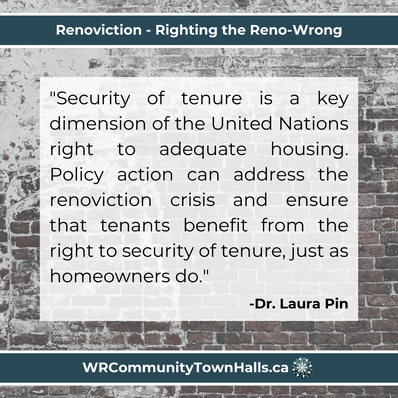Dr. Laura Pin
Assistant Professor, Department of Political Science, Wilfrid Laurier University
|
My research examines how social inequality intersects with policy-governance regimes and how political scientists can use community engaged research to understand participation in public policy. I work in the areas of public budgeting, housing policy, and civic engagement. I completed my PhD in political science at York University and did postdoctoral training at the Community Engaged Scholarship Institute at the University of Guelph.
|
Presentation
Dr. Laura Pin expressed her deep frustration at the tension between property rights and the human right to housing, specifically in the context of renovictions. She attributes much of this issue to the policy of "vacancy decontrol," implemented in the 90s, which incentivizes landlords to evict tenants to reset the rent at market rates. The system disproportionately places the onus on tenants to enforce their rights, often under duress from landlords who use extra-legal measures to force them out.
|
|
Pin praised the idea of landlord registries and rent banks, tools that can aid tenants facing the risk of eviction. These rent banks could function as hubs for legal and financial assistance, much like in British Columbia and Manitoba. However, Pin ultimately sees real rent control as the definitive solution to the renoviction crisis, and the current provincial government's lack of interest in establishing rent banks or expanding social programs makes social and political pressure crucial.
A significant piece of advice Pin gave was that tenants should never vacate their units based solely on receiving forms like N13 from landlords; only a sheriff can enforce an eviction. She also acknowledged the existing gaps in tenant protection and rent regulation, underscoring that while municipalities are making strides, this is fundamentally a provincial issue requiring state-level interventions.
A significant piece of advice Pin gave was that tenants should never vacate their units based solely on receiving forms like N13 from landlords; only a sheriff can enforce an eviction. She also acknowledged the existing gaps in tenant protection and rent regulation, underscoring that while municipalities are making strides, this is fundamentally a provincial issue requiring state-level interventions.




